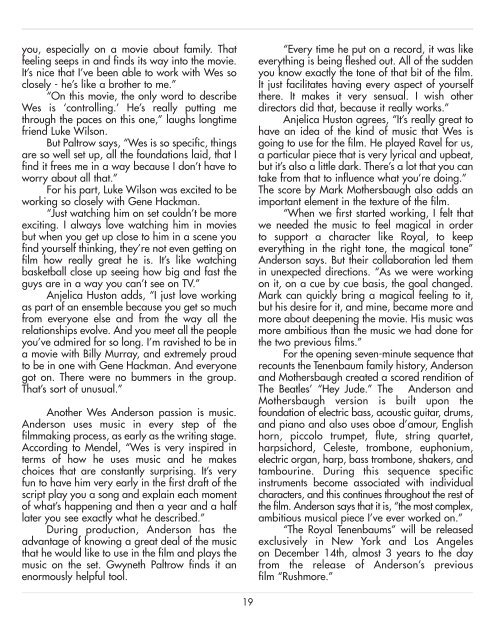Royal Tenenbaum - The Rushmore Academy
Royal Tenenbaum - The Rushmore Academy
Royal Tenenbaum - The Rushmore Academy
Create successful ePaper yourself
Turn your PDF publications into a flip-book with our unique Google optimized e-Paper software.
you, especially on a movie about family. That<br />
feeling seeps in and finds its way into the movie.<br />
It’s nice that I’ve been able to work with Wes so<br />
closely - he’s like a brother to me.”<br />
“On this movie, the only word to describe<br />
Wes is ‘controlling.’ He’s really putting me<br />
through the paces on this one,” laughs longtime<br />
friend Luke Wilson.<br />
But Paltrow says, “Wes is so specific, things<br />
are so well set up, all the foundations laid, that I<br />
find it frees me in a way because I don’t have to<br />
worry about all that.”<br />
For his part, Luke Wilson was excited to be<br />
working so closely with Gene Hackman.<br />
“Just watching him on set couldn’t be more<br />
exciting. I always love watching him in movies<br />
but when you get up close to him in a scene you<br />
find yourself thinking, they’re not even getting on<br />
film how really great he is. It’s like watching<br />
basketball close up seeing how big and fast the<br />
guys are in a way you can’t see on TV.”<br />
Anjelica Huston adds, “I just love working<br />
as part of an ensemble because you get so much<br />
from everyone else and from the way all the<br />
relationships evolve. And you meet all the people<br />
you’ve admired for so long. I’m ravished to be in<br />
a movie with Billy Murray, and extremely proud<br />
to be in one with Gene Hackman. And everyone<br />
got on. <strong>The</strong>re were no bummers in the group.<br />
That’s sort of unusual.”<br />
Another Wes Anderson passion is music.<br />
Anderson uses music in every step of the<br />
filmmaking process, as early as the writing stage.<br />
According to Mendel, “Wes is very inspired in<br />
terms of how he uses music and he makes<br />
choices that are constantly surprising. It’s very<br />
fun to have him very early in the first draft of the<br />
script play you a song and explain each moment<br />
of what’s happening and then a year and a half<br />
later you see exactly what he described.”<br />
During production, Anderson has the<br />
advantage of knowing a great deal of the music<br />
that he would like to use in the film and plays the<br />
music on the set. Gwyneth Paltrow finds it an<br />
enormously helpful tool.<br />
19<br />
“Every time he put on a record, it was like<br />
everything is being fleshed out. All of the sudden<br />
you know exactly the tone of that bit of the film.<br />
It just facilitates having every aspect of yourself<br />
there. It makes it very sensual. I wish other<br />
directors did that, because it really works.”<br />
Anjelica Huston agrees, “It’s really great to<br />
have an idea of the kind of music that Wes is<br />
going to use for the film. He played Ravel for us,<br />
a particular piece that is very lyrical and upbeat,<br />
but it’s also a little dark. <strong>The</strong>re’s a lot that you can<br />
take from that to influence what you’re doing.”<br />
<strong>The</strong> score by Mark Mothersbaugh also adds an<br />
important element in the texture of the film.<br />
“When we first started working, I felt that<br />
we needed the music to feel magical in order<br />
to support a character like <strong>Royal</strong>, to keep<br />
everything in the right tone, the magical tone”<br />
Anderson says. But their collaboration led them<br />
in unexpected directions. “As we were working<br />
on it, on a cue by cue basis, the goal changed.<br />
Mark can quickly bring a magical feeling to it,<br />
but his desire for it, and mine, became more and<br />
more about deepening the movie. His music was<br />
more ambitious than the music we had done for<br />
the two previous films.”<br />
For the opening seven-minute sequence that<br />
recounts the <strong>Tenenbaum</strong> family history, Anderson<br />
and Mothersbaugh created a scored rendition of<br />
<strong>The</strong> Beatles’ “Hey Jude.” <strong>The</strong> Anderson and<br />
Mothersbaugh version is built upon the<br />
foundation of electric bass, acoustic guitar, drums,<br />
and piano and also uses oboe d’amour, English<br />
horn, piccolo trumpet, flute, string quartet,<br />
harpsichord, Celeste, trombone, euphonium,<br />
electric organ, harp, bass trombone, shakers, and<br />
tambourine. During this sequence specific<br />
instruments become associated with individual<br />
characters, and this continues throughout the rest of<br />
the film. Anderson says that it is, “the most complex,<br />
ambitious musical piece I’ve ever worked on.”<br />
“<strong>The</strong> <strong>Royal</strong> <strong>Tenenbaum</strong>s” will be released<br />
exclusively in New York and Los Angeles<br />
on December 14th, almost 3 years to the day<br />
from the release of Anderson’s previous<br />
film “<strong>Rushmore</strong>.”


